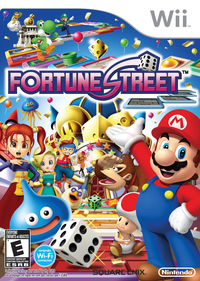From NintendoWiki, your source on Nintendo information. By fans, for fans.
| "Fortune Street"
|

Cover artwork of "Fortune Street"
|
|
|
|
| N. America:
|
December 5, 2011
|
| Japan:
|
December 1, 2011
|
| Europe:
|
January 5, 2012
|
| Australia:
|
January 6, 2012
|
|
|
|
|
|
Fortune Street (Boom Street in Europe) is a Wii video game developed by Square Enix that crosses over the Dragon Quest and Mario franchises. The game is a follow-up to Itadaki Street DS which is a part of the Itadaki Street series. The game plays in a board format similar to Monopoly in concept featuring famous locations from both series.
Official Description
Gameplay
The game has four characters from either series traverse a board based a famous location with the goal of breaking a threshold of money or forcing the other players to become bankrupt. Players earn money by collecting their salary by collecting all four suits around the board, other players landing on their properties, earning commissions off properties and raising the stock price in district they own stocks in. Each board is divided into districts with the smaller districts being 4 properties. When a player owns another property in the same district, both properties increase in value by a factor with the factor growing with more properties in the same district owned. Players can also increase the price of they own by investing money when they land on one of their own properties. The investment is limited by the stock investment of the district it's in as well as its value.
The players traverse the board by rolling a dice (which can go up to 8 on the larger boards). Players can purchase properties at its stated price if its unowned or for 5 times its value if another player owns it. There are also event spaces like the venture spaces, which shows a 8x8 board of various events similar to Chance cards in Monopoly. Around the board are 4 different suits that also function as venture spaces. After returning to the bank with all four suits, the player earns a salary based on the number of properties they own and the amount invested in stocks. This tends to be the main way to inject money into the game.
Stocks can be purchased at a bank or on a stockbroker square, but can only be bought in sets of up to 99. Selling stocks does not have the same restriction. Usually, when buying 10 or more stocks, it raises the stock price in same district, with the reverse also being true. If a player lands on a property another player owns in a district, whoever owns stock in that district earns a up to 10% commission derived from the ratio of stocks owned by players in that district.
Easy Rules
The Easy Rules remove several complex elements including stocks, vacant lots and districts. To increase the price of property, players must purchase properties in a row.
==Development
Reception
